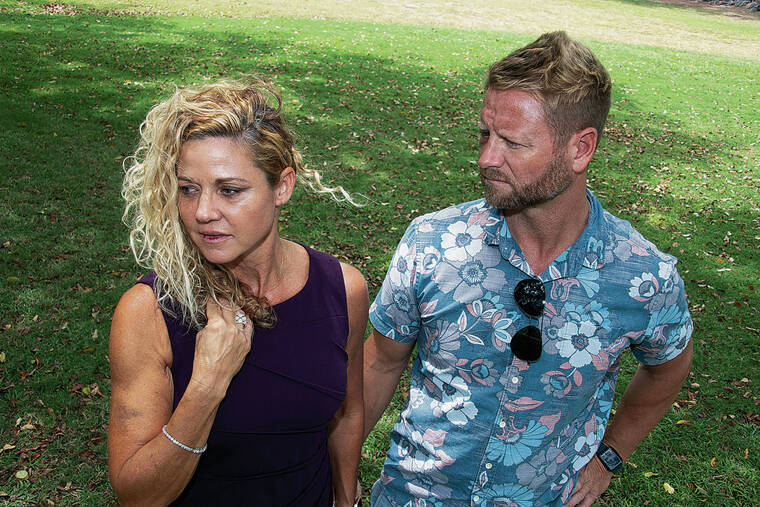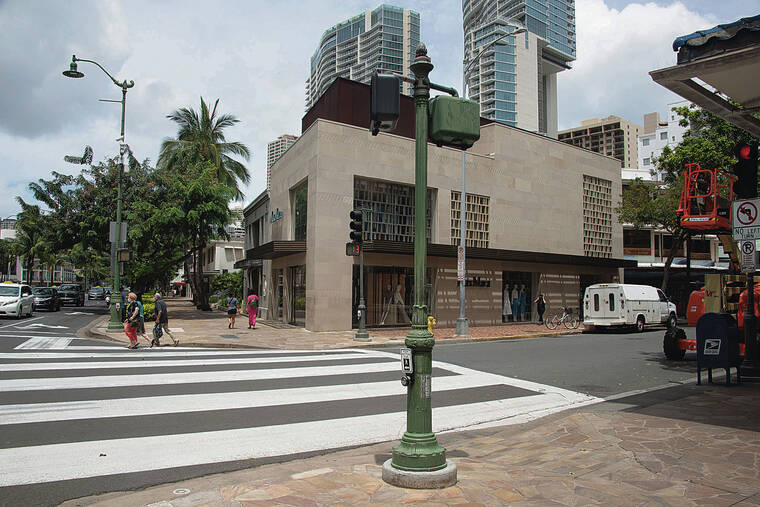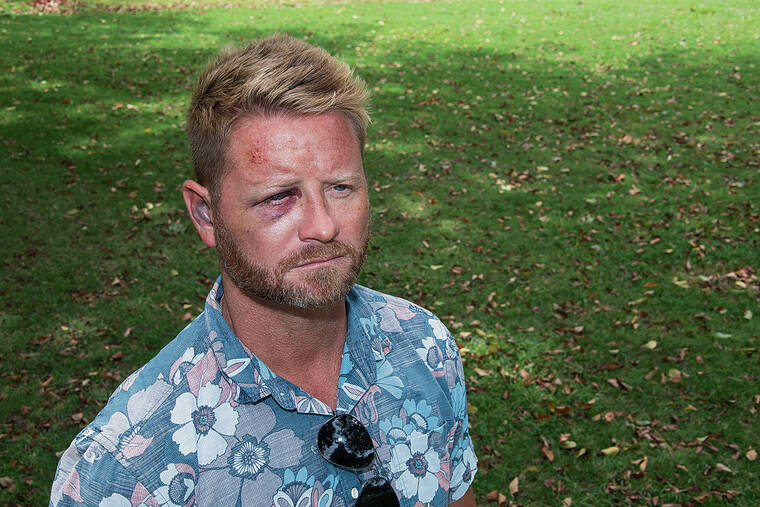Military veteran Joe Herter made his way back safely from Operation Iraqi Freedom with a combat action badge and medals, but on March 27 he almost didn’t make it back to his Waikiki home after he and his girlfriend were assaulted by a group of people as they left Kelley O’Neil’s Bar & Grill with two other couples.
The 1:20 a.m. attack took place at the same corner where Marqus McNeil, 20, was fatally shot eight days earlier, putting Waikiki on high alert. A grand jury indicted Justice Kaio, 19, in connection with that case on charges of second-degree murder and firearm offenses.
Hawaii Lodging and Tourism Association President and CEO Mufi Hannemann said he plans to gather Waikiki stakeholders and law enforcement and criminal justice officials for a public safety coalition meeting the first week of May to address the crimes that have been occurring since Waikiki’s economy reopened and visitors have come back.
He said Honolulu City Council Chair Tommy Waters also has talked about taking on the topic in an upcoming Waikiki community meeting similar to the one Waters held in 2019 with state Sen. Sharon Moriwaki (D, Kakaako-McCully-Waikiki) to address a wave of property and violent crimes that had residents on edge.
Hannemann called the attack on Herter, Amanda Canada and their friends, who also have military ties, senseless and part of a cycle of growing concern.
“There have been stabbings, there have been people who have been shot, attempted murders, suspected peeping Toms,” he said. “Just looking at the (Honolulu Police Department) crime-mapping site, there are almost 100 violent crimes that have occurred in the 96815 ZIP code from January to April.”
Police Maj. Randy Platt, Waikiki commander, told the Honolulu Star-Advertiser in an email that HPD is investigating the March 27 attack as a second-degree assault case due to Herter’s injuries and second-degree robbery since Canada’s handbag was taken by force.
No arrests have been made and the investigation remains open, Platt said.
Herter and Canada, who are white-collar professionals, say they no longer consider Waikiki safe. They are hopeful police will find the people who hurt them and that they will be brought to justice.
“I was dragged into the street by my hair. They pulled my earrings out of my ears,” Canada said. “I was facedown on the concrete getting kicked and getting yelled at, and then suddenly all of the blows stopped and I see (Joe) on the ground being assaulted.”
Canada’s purse was stolen, a loss of about $1,030, including her cellphone and sunglasses.
Herter said he was overwhelmed by an estimated four to six young men who repeatedly kicked him in the head, fracturing his eye socket. He said one of his military officer buddies was clocked in the back of the head while seeking assistance from a bar bouncer, and the other party, which also included a military officer, called police.
“I’ve had bombs blow up around me. I was trained in martial arts and combatives,” Herter said. “This was the first time in my life where I felt like I was going to die. I saw stars over and over again.
“If my friend had not called the police, I don’t think I would still be alive,” he said. “They shouted things like, ‘What are you doing on our block, haole?’ — and they didn’t stop beating me and kicking my head until the police arrived.”
The pair said they consider the incident a hate crime and believe they were targeted because they are Caucasian and have military connections.
The scene of the assault is near a part of Waikiki the military had previously considered putting off-limits in 2018 after three military members were stabbed, one fatally.
That step, which would have blocked some 10% of Oahu’s population from patronizing Waikiki, was avoided when Hannemann and other members of the Waikiki, law enforcement and tourism communities formed the public safety coalition that he is bringing together for a follow-up meeting.
Crimes have waxed and waned over the past few years as officials have tried to stay on top of what happens in the district, an area of some 1.5 square miles that is bordered by the Ala Wai Canal, Diamond Head and the Pacific Ocean.
Platt said that “during the pandemic and shutdown of tourism, crime was very low in Waikiki.”
“Many businesses were closed, and few people were on the streets and beaches,” he said. “As tourism returned, so has criminal activity. HPD anticipates crime stats to increase as businesses fully reopen and large events, such as parades, block parties and concerts, resume.”
Platt said the overall violent crime rate for Waikiki is now higher than in 2021 but is still below or comparable to the pre-pandemic crime rate.
“The most serious recent crimes are last month’s fatal shooting, which occurred between individuals who, according to family members, had a long-running disagreement. The suspect turned himself in the next day,” he said. “In a second incident last month, a male was arrested for attempted murder following an argument over loud music.”
HPD crime-mapping statistics show where crimes are reported, not necessarily where they occur. State Rep. Adrian Tam (D, Waikiki-Ala Moana-Kakaako) said the statistics are still concerning because they show that crimes are reported in higher concentrations by people in Waikiki, which he believes is proof that criminals target visitors.
“There was a week where 17% of all crimes on Oahu were reported in Waikiki,” Tam said. “It’s easier to commit a crime against a visitor than a resident.”
Crimes targeting tourists are typically crimes of opportunity, Platt said.
“Criminals often look for unattended belongings left on the beach or poolside, unlocked vehicles and vehicles with valuables in plain view,” he said. “At night, intoxicated individuals can become easy theft or robbery victims because they are less likely to defend themselves or to remember details of what happened.”
Hannemann said cohesive community efforts to support public safety have made a difference when Waikiki experienced prior crime surges.
In the past, Waikiki’s visitor industry and other community members have supported programs that offer assistance to the district’s homeless population, including airfare to return to the mainland. They have provided funding to youth programs such as Adult Friends for Youth, which serves youth who are engaged in violent and destructive behavior by trying to provide alternatives to gang membership, violence and school failure.
They also have worked to install better lighting in dark corners of Waikiki and cover more of the district with security cameras that assist law enforcement.
Platt said HPD already has increased police presence and visibility in Waikiki, especially in areas known for criminal activity.
“Fourth Watch or recently graduated officers have been assigned to supplement the patrol shifts. Some officers from support units, such as the bike and ATV details, have been shifted to patrol as well,” he said. “They, along with plainclothes officers, have conducted drug and other enforcement operations, often at night on the beach or in parks or areas that have generated complaints.”
Tam said he and Moriwaki support community efforts to improve public safety and continually look for legislative solutions that could make a difference.
Tam introduced legislation this session that would allow visitors to testify online rather than having to return to Hawaii to hold defendants accountable. He said the measure is unlikely to pass because the Judiciary and the Public Defender’s Office are opposed to it.
“We have a confrontation clause that the defendant has a right to confront their accuser in person,” Tam said. “You’d think we’d be able to work with courthouses across the nation to allow witnesses to do it virtually in their own towns. We aren’t there yet.”
Moriwaki introduced a measure, which has stalled, that would place a geographic ban on offenders with four or more misdemeanors in the same business or resort district for a specific period of time.
“Criminals are opportunistic. They go places where there are vulnerable people and they can get away with it,” she said.
Hannemann said he plans to make another pitch to Honolulu Prosecuting Attorney Steve Alm about bringing Weed and Seed to Waikiki. The multiagency program seeks to “weed out” criminals from a particular district and then “seed” communities by investing in social and economic revitalization.
“We’ve been in close communications with Prosecutor Alm. They’ve only said it was a matter of timing and resources. They wanted to first go into Chinatown, and they did that successfully. They also had plans to go back to Ewa. Our hope is always to accelerate the timetable into Waikiki,” Hannemann said.
He said he also plans to involve Deborah L.K. Spencer- Chun, president and CEO of Adult Friends for Youth, in assisting officials in addressing Waikiki crimes involving young perpetrators.
While the pandemic slowdown lessened some types of crime, Spencer-Chun said the agency experienced a higher volume of calls related to troubled youth, who were acting out more due to economic woes and disruptions in family dynamics.
“We were getting more calls on a weekly basis than we ever saw before,” she said.
When Waikiki was slow, according to Spencer-Chun, youth crimes usually involved break-ins at stores that were closed. Now that people have come back to Waikiki, she said there are calls about conflicts.
“Most of the kids come into Waikiki from other communities,” she said. “The attraction is that they have a need. The pandemic created an even wider gap between the ‘haves’ and the ‘have-nots.’
“We are also seeing emotional responses. They are witnessing job loss, eviction, families that can’t pay,” she said. “I’m not saying it’s right, but they are frustrated. There are layers and layers of issues that we need to deal with.”
Spencer-Chun said the community response to violent crime needs to include investing in outreach for the neighborhoods outside of Waikiki where troubled youth live. The focus can’t be all about gun laws, she said.
“These kids are not following gun laws. Also, it’s not just about guns; we get calls about kids with machetes and other weapons,” she said. “The (March 19) shooting in Waikiki was an ongoing problem from high school, and it was a girl issue. These are the kinds of things we want to mediate so that we can prevent escalation.”






